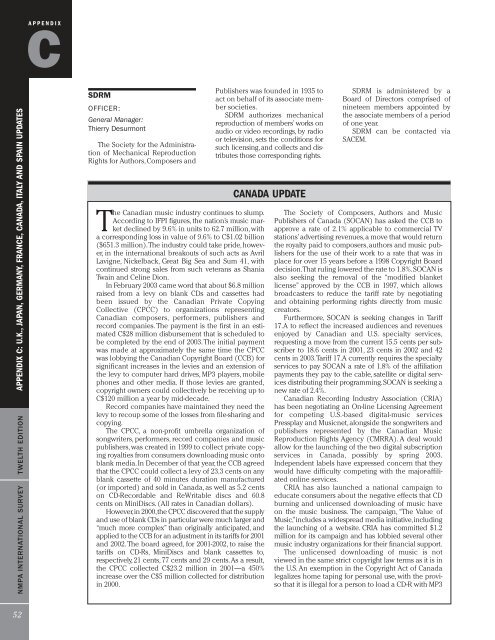NMPA_International_Survey_12th_Edition
NMPA_International_Survey_12th_Edition
NMPA_International_Survey_12th_Edition
You also want an ePaper? Increase the reach of your titles
YUMPU automatically turns print PDFs into web optimized ePapers that Google loves.
APPENDIX<br />
C<br />
<strong>NMPA</strong> INTERNATIONAL SURVEY TWELTH EDITION APPENDIX C: U.K., JAPAN, GERMANY, FRANCE, CANADA, ITALY AND SPAIN UPDATES<br />
SDRM<br />
OFFICER:<br />
General Manager:<br />
Thierry Desurmont<br />
The Society for the Administration<br />
of Mechanical Reproduction<br />
Rights for Authors,Composers and<br />
The Canadian music industry continues to slump.<br />
According to IFPI figures, the nation’s music market<br />
declined by 9.6% in units to 62.7 million, with<br />
a corresponding loss in value of 9.6% to C$1.02 billion<br />
($651.3 million).The industry could take pride,however,<br />
in the international breakouts of such acts as Avril<br />
Lavigne, Nickelback, Great Big Sea and Sum 41, with<br />
continued strong sales from such veterans as Shania<br />
Twain and Celine Dion.<br />
In February 2003 came word that about $6.8 million<br />
raised from a levy on blank CDs and cassettes had<br />
been issued by the Canadian Private Copying<br />
Collective (CPCC) to organizations representing<br />
Canadian composers, performers, publishers and<br />
record companies. The payment is the first in an estimated<br />
C$28 million disbursement that is scheduled to<br />
be completed by the end of 2003.The initial payment<br />
was made at approximately the same time the CPCC<br />
was lobbying the Canadian Copyright Board (CCB) for<br />
significant increases in the levies and an extension of<br />
the levy to computer hard drives, MP3 players, mobile<br />
phones and other media. If those levies are granted,<br />
copyright owners could collectively be receiving up to<br />
C$120 million a year by mid-decade.<br />
Record companies have maintained they need the<br />
levy to recoup some of the losses from file-sharing and<br />
copying.<br />
The CPCC, a non-profit umbrella organization of<br />
songwriters, performers, record companies and music<br />
publishers,was created in 1999 to collect private copying<br />
royalties from consumers downloading music onto<br />
blank media.In December of that year,the CCB agreed<br />
that the CPCC could collect a levy of 23.3 cents on any<br />
blank cassette of 40 minutes duration manufactured<br />
(or imported) and sold in Canada, as well as 5.2 cents<br />
on CD-Recordable and ReWritable discs and 60.8<br />
cents on MiniDiscs. (All rates in Canadian dollars).<br />
However,in 2000,the CPCC discovered that the supply<br />
and use of blank CDs in particular were much larger and<br />
“much more complex” than originally anticipated, and<br />
applied to the CCB for an adjustment in its tariffs for 2001<br />
and 2002.The board agreed, for 2001-2002, to raise the<br />
tariffs on CD-Rs, MiniDiscs and blank cassettes to,<br />
respectively, 21 cents, 77 cents and 29 cents.As a result,<br />
the CPCC collected C$23.2 million in 2001—a 450%<br />
increase over the C$5 million collected for distribution<br />
in 2000.<br />
Publishers was founded in 1935 to<br />
act on behalf of its associate member<br />
societies.<br />
SDRM authorizes mechanical<br />
reproduction of members’ works on<br />
audio or video recordings, by radio<br />
or television, sets the conditions for<br />
such licensing,and collects and distributes<br />
those corresponding rights.<br />
CANADA UPDATE<br />
SDRM is administered by a<br />
Board of Directors comprised of<br />
nineteen members appointed by<br />
the associate members of a period<br />
of one year.<br />
SDRM can be contacted via<br />
SACEM.<br />
The Society of Composers, Authors and Music<br />
Publishers of Canada (SOCAN) has asked the CCB to<br />
approve a rate of 2.1% applicable to commercial TV<br />
stations’advertising revenues,a move that would return<br />
the royalty paid to composers,authors and music publishers<br />
for the use of their work to a rate that was in<br />
place for over 15 years before a 1998 Copyright Board<br />
decision.That ruling lowered the rate to 1.8%.SOCAN is<br />
also seeking the removal of the “modified blanket<br />
license” approved by the CCB in 1997, which allows<br />
broadcasters to reduce the tariff rate by negotiating<br />
and obtaining performing rights directly from music<br />
creators.<br />
Furthermore, SOCAN is seeking changes in Tariff<br />
17.A to reflect the increased audiences and revenues<br />
enjoyed by Canadian and U.S. specialty services,<br />
requesting a move from the current 15.5 cents per subscriber<br />
to 18.6 cents in 2001, 23 cents in 2002 and 42<br />
cents in 2003.Tariff 17.A currently requires the specialty<br />
services to pay SOCAN a rate of 1.8% of the affiliation<br />
payments they pay to the cable, satellite or digital services<br />
distributing their programming.SOCAN is seeking a<br />
new rate of 2.4%.<br />
Canadian Recording Industry Association (CRIA)<br />
has been negotiating an On-line Licensing Agreement<br />
for competing U.S.-based digital-music services<br />
Pressplay and Musicnet,alongside the songwriters and<br />
publishers represented by the Canadian Music<br />
Reproduction Rights Agency (CMRRA). A deal would<br />
allow for the launching of the two digital subscription<br />
services in Canada, possibly by spring 2003.<br />
Independent labels have expressed concern that they<br />
would have difficulty competing with the major-affiliated<br />
online services.<br />
CRIA has also launched a national campaign to<br />
educate consumers about the negative effects that CD<br />
burning and unlicensed downloading of music have<br />
on the music business. The campaign, “The Value of<br />
Music,”includes a widespread media initiative,including<br />
the launching of a website. CRIA has committed $1.2<br />
million for its campaign and has lobbied several other<br />
music industry organizations for their financial support.<br />
The unlicensed downloading of music is not<br />
viewed in the same strict copyright law terms as it is in<br />
the U.S. An exemption in the Copyright Act of Canada<br />
legalizes home taping for personal use, with the proviso<br />
that it is illegal for a person to load a CD-R with MP3<br />
52


